Queen of Dragons d-3 Read online
Queen of Dragons
( Drakon - 3 )
Shana Abe
Hidden among the remote hills of eighteenth-century England lives a powerful clan of shape-shifters who've become the stuff of myths and legends. They are the drákon—supersensual creatures with the ability to Turn from human to smoke to dragon. Now a treacherous new enemy threatens to destroy their world of magic and glittering power.
For centuries, they thought themselves alone at Darkfrith, but the arrival of a stunning letter from the Princess Maricara sent from the Carpathian Mountains of Transylvania suggests the existence of a lost tribe of drákon. It is a possibility that the Alpha lord, Kimber Langford, Earl of Chasen, cannot ignore. For whoever this unknown princess may be, she's dangerous enough to know about the drákon's existence—and where to find them. That, as Kimber can't help but concede, gives her a decidedly deadly advantage. And, indeed, it wouldn't be long before Maricara breached the defenses of Darkfrith and the walls around Kimber's heart. But the mystery of the princess's real identity and the warning she has come to deliver, of a brutal serial killer targeting the drákon themselves, seem all but impossible to believe. Until the shadowed threat that stalks her arrives at Darkfrith, and Kimber and Maricara must stand together against the greatest enemy the drákon have ever faced—an enemy who may or may not be one of their own. They have no choice but to yield to their passionate attraction for each other. But for two such very different drákon leaders, will an alliance of body and soul mean their salvation, their extinction… or both?
For Shauna Summers, with heartfelt gratitude for her grace and guidance.
A zillion thanks as well to Annelise Robey and Andrea Cirillo, who always believed, and to Nita Taublib, who pushed me so wisely.
And to the family: I love you.
January 12, 1774
Mother, Father,
I pen this missive knowing it will arrive a most unpleasant surprise to you. No doubt you thought me still at the Wallence School for Young Ladies in Edinburgh. It is just past Christmas, though, so perhaps you've realized by now that I'm not where I promised I would be. My heart breaks to think of the worry I might have caused you. I apologize. Never would I have done this thing had the circumstances not been so very dire. The stone you sought has been made safe.
I understand what I've done. I've broken tribal laws to a degree I've never even heard before whispered. Please know I did not do any of this lightly. I am no longer a child but a woman full grown, and one of our kind in every way. Allow me to repeat: In every way. When I return to Darkfrith, I shall accept my punishment. I bow to your will and that of the council.
I have been staying in a castle in the Carpathian Alps as a guest of a most unusual princess, who has kindly agreed to forward this letter to you. She, too, is fully one of our kind. Certainly you will be as shocked by this news as I was. There are more of us, quite a few more, than we ever imagined. They live like gypsies here, entrenched beneath the stars, in secluded villages or in this fortress. The nights descend so bright and hushed you can hear every diamond, every pebble and trickle of gold in the streams. You can fly into forever.
I am wed now. My husband is Zane. I'm sorry.
All my love,
Lia
PROLOGUE
There exists a world beyond your own. There exists a world of frozen savagery, of ice and snow, and needle-tipped mountains draped smoky emerald in summer, and dusky blue every autumn. In this world, your safe and pleasant life is vanished, a mere illusion revealed. Comets are born here. Stars are stirred. Glaciers steam; diamonds sparkle; silent music saturates the very air—and mighty dragons tear furrows through it all, breathing light and fire in crystalline exhalations.
All other creatures cower here. You are not welcome, so do not come. Should we see you, we might cast our pity downward to your earth, to grant you time to turn and hide.
We might not.
The sky is our realm. The mountains are our sanctuary. We are the drakon.
You fear us. It is why you've stalked us for centuries, why you pursue us still in this age of reason and enlightenment. You used arrows before, crossbows, and we soared higher. You hold muskets and pistols now; you dream of stabbing our hearts clean with elegant French swords. Despite your frail bodies, over the years, you have diminished us.
So we have learned to deceive you.
All of nature celebrates our beauty, but now we look much as you do. We speak your words and wear your clothing and drink your wine. Like you, we breathe and feel and fall in love; we wed and raise our children. We bleed. We wage war.
We will not show you our true selves unless you are so unwise as to leave us no choice. That will, of course, be your final mistake, because unlike you, we have many more Gifts at our disposal: We hear the music of metal and stones. We hunt with talons, we Turn to smoke. Some of us even have the Gift of suggestion, to push you into our will.
Although there are far fewer of us, we are faster than you, stronger, more sly. All we require is that whisper of air beneath your bedroom door—through a keyhole, down a chimney—and any haven you held against us is breached.
You must understand that war against humans is distasteful to us. Our honor demands we crush you swiftly; it is shameful to toy with the lesser beings. These skirmishes usually end quickly in silence and death.
But war against other dragons... that is a thing of wonder. The stars themselves shudder and weep.
We began all in the same place, we drakon. Aeons ago we scorched into life, smashing through cosmic whirlwinds and stars, red-hot lava sizzling on our scales, living kin to fire and smoke and sooty diamonds. We were born here, at the fanged edge of sky and earth called Carpathians, long before you Others arrived.
We ruled and ruled well. The stones beckoned us and we heeded them. The metals sang and we unearthed them, worked them into braids for our hair, and necklaces, and chalices. We built a castle of quartzite and gems. We practiced spells without words, and listened to the sweet singing magic of the jasper and rubies and diamonds. Some stones were benign; some were not. But as a family, we mastered them.
Then you came, O Man. Crawling from the mud, casting your eyes upward; everything you saw you coveted. We wore gold and copper; you wore skins. We infused our glory into the mountains and woods; you ripped it away. You felled the trees, and dammed the streams, and crept in a plague up our slopes, never ceasing. We had no choice but to fight you.
Like fleas, you multiplied and spread. It is the only reason you won.
And that was when we split apart. That was the end of the dread union of the drakon; you managed that much, at least. Nearly all fled the castle; only two remained. From that two came seven, then fifteen, then forty-two.
We discovered we could seduce you. We could play upon your fears. In our human disguise we evolved into warriors and lords and princes. We laid our shadows across your land, and you learned to tremble and to worship us.
In time, we forgot about our original family. We forgot that once there were more of us, just as those who had left had forgotten us too.
There were better years and worse ones. There were good stones and one of very ill fortune—I'll tell you more of that later. We survived all these things for centuries, waxing and waning, until one winter's day there came a new dragon, an Englishwoman, to our castle on the mountain. She brought with her revelations: tales of a cloudy rich shire, with heavy woods and silver mines and no Others for miles about. A land populated purely by our kind, a secret sanctuary surrounded by green English hills and meadows.
She brought with her also one of you. An Other. A thief.
Together they wrought havoc on our realm.
Perhaps such a thing was inevitable. We are dragon
s, after all. We do not dwell in static quiet; we crave flight and glory and can spin Change from the smallest of molecules.
It seems very strange, does it not, that there would be a tribe of us living in silence like little mice?
Letter to the Princess Maricara of the Zaharen
Of the castle Zaharen Yce
Of the D--------n
Carpathian Mountains, Transylvania
[Translated from the French]
May 27, 1774
Your Royal Grace,
We find it difficult to convey in the space of this missive our great astonishment and pleasure at the news of your existence. Your letter of January last, along with Lady Amalia's, arrived this very evening. It has been cause of much celebration here in our shire. We are relieved to hear of the safety of a beloved daughter of the tribe, and trust that she is now on her way home to us. We are most pleased to discover you as well.
You must understand that, until this day, we had believed ourselves to be the last of our kind. (Forgive our reluctance to name ourselves so readily as you have done. Here in England, such a word is not spoken easily.) We have been settled in Darkfrith for generations, and knowledge of our origins had long ago vanished.
We dare to presume to be related to you and your people. Indeed, we hope to persuade you to visit our land and meet your distant kin. You would be entirely welcome. Or, should Your Grace permit, we might come to you. All we ask is your direction, and of course, your gracious consent.
On behalf of the Marquess and Marchioness of Langford and the members of our tribe, we remain, Your servants,
Kimber Ellery Darce Langford, Earl of Chasen, &
Council Members
Letter to the Earl of Chasen
Of Chasen Manor
Darkfrith, York
England
3 October 1774
Gentle Lord, Members of the Council,
We ourselves are greatly pleased to find our English cousins. Although I will not repeat the word you found so distressing, I must relay to you that here in my land, what we are is well known. It is in the history of our fortress. It is in the folklore of the serfs.
I regret to inform you that travel at this time will be impossible. Since the death of my husband last year, there has been a slight unrest within the castle. It is nothing so very serious, merely enough to warrant all of my full attentions. Naturally there is a new prince for the throne, my brother, but as I am more skilled in these matters, it is my joy to supervise the hold until he is old enough to take command as he should.
Please convey my salutations to the Lady Amalia and her husband. Very truly,
Maricara of the Zaharen
February 23, 1775
Your Grace,
It grieves us to hear of any jeopardy or peril surrounding you. We offer our assistance in any manner you should desire. Without doubt you are a strong and capable ruler, but perhaps a widow alone, even a princess, would do well with a guard? We ourselves make use of such measures on occasion for our kind, and would be honored to offer any small skills we possess to you, and of course, your younger brother.
We may be ready in a matter of days, should you wish it. Your castle is in the northern Alps?
Chasen
Council Members
5 January 1776
Good Sirs,
I thank you for your kind and generous offer of assistance, but must firmly decline. Please do not come. Such strangers in the castle now will only invoke further unease. Although I am young in years, I assure you, I have my people well in hand. They understand who and what I am. We have only a few minor discontents, and very little bloodshed.
My gratitude for your concern.
The Princess Maricara
July 20, 1776
Your Royal Grace,
Forgive my boldness. If I might inquire: How old are you?
—Kimber
18 November 1777
Lord Chasen,
I have fifteen years.
—Maricara
Transcript from Special Session of the Drakon Council,
called This Noonday, March9, 1778
As faithfully transcribed by Council Scribe
Sir Nicholas Beaton
In Session: Sir Rufus Booke; Calvin Acton; Theodore Henry; John Chapman; Tamlane Williams; Erik Sheehan; Adam Richards; Anton Larousse; Claude Grady; Devon Rickman; Kimber Langford, E.o.C.; Lord Rhys Langford
Without: Christoff, Marquess of Langford
[In the absence of the Marquess of Langford, eldest son Lord Chasen presides as Alpha]
The issue of the Zaharen drakon has been raised again. Renewed urgency at revelation of age of professed leader Her Grace the Princess Maricara. The question before the council has been raised [proposed: CG; seconded: AR] regarding the situation of HG Maricara.
Status: Widow
Status of Turn: Apparent Positive
Status of Dragon: Apparent Positive
Age: 15
[Due to continued nonappearance of Lady Amalia Langford and so-called husband Zane, all Apparents as yet unconfirmed.]
Motion made before the Council to form party to reconnaissance Zaharen drakon.
Motion made before the Council to appropriate Zaharen drakon/resources.
Motion made before the Council to wed HG Maricara to Alpha heir Kimber Langford as soon as legally viable.
All motions passed.
CHAPTER ONE
April 1782
Four Years Later
It was a night without moon or stars, the clouds boiling heavy with dark, impending snow, masking not only the ruts of the road but also anything that might be hiding above. Anything lethal.
Fortunately, he didn't truly need to see to sense an aerial threat. He felt them occasionally, or thought he did: distant tremors in the air, never too close, usually so faint he half thought he was imagining it.
The cold seemed the greater threat, actually. He'd never known a spring night this frigid, not in his life, and wondered how the bloody hell anyone managed to live here. Springtime at home meant bright green crocuses and warmed streams splashing free of their ice—not this. Not this bitter, relentless chill that sliced through his greatcoat and froze to frost inside his mouth and nose.
His horse stumbled, pitching him forward in the saddle. He righted himself and tried to calm her with a hand to her neck, but the mare only shuddered at his touch. He pulled back again.
Riding horseback was never ideal. But he'd been unable to hire a coach to take him up these mountain roads, no matter how much he offered. No one wanted to venture here.
And that was good, he knew. It meant, finally, that he was close.
The mare skipped to a halt, sending him forward again. He swore under his breath, snapping the reins, but she would not move. When he used his spurs she tossed her head and reared; he held on with both hands, but she only went into a buck, panicked, squealing, and he realized suddenly that there was something ahead of them on the road, something that spooked her.
He lost his grip. He hit the ground and then lost his breath, managing a roll to his feet, swiping the mud from his eyes. The mare pounded off and the danger-sense grew and the skin crawled along his spine—he was already Turning, but it was cold, and he was winded. And it was too late.
Her morning began the way too many of her mornings did: with the wind blowing her hair in heavy ropes across her face, her body curled in a ball atop a loose mound of hay, her fists clenched. Even her toes clenched. She wore no clothing. Beneath the hay, the terrace floor was cold, cold—nearly as cold as the ice topping the mountains, just as glimmering, milky-pale stone hewn from the hills centuries past.
Her mouth tasted of ashes. Her hair smelled of smoke.
Maricara opened her eyes, then closed them again. The sky above loomed pink and scarlet-gold, domed with soft, glamorous clouds all rimmed in gilt. It was wildly beautiful and deeply inviting, a sky fit for a princess. Or at least a serf masquerading as one.
&nbs
p; For an instant—a brief, wistful flicker of time—she pretended she was still asleep. In a bed. With pillows.
The wind stole her hair again, whipping it hard over her nose. Definitely woodsmoke.
Cautiously, she began to stretch. Fingers, toes, the warm tucked spaces of her body chilled at once as she flexed against the straw. Nothing broken. Some pain in her left hand, bruised knuckles. A cut along her belly.that could be a problem. A stomach wound meant she had either flown too low or reared up too high.
Mari sat up and explored the wound, sucking in air to dispel the pain. The edges were clean, razored, and not terribly deep—but it hurt. She'd have to wash it carefully; the last thing she needed was blood poisoning.
She climbed to her feet, brushing the loose twigs from her torso, bending down to get her legs. She shook back her hair and spoke to the open view before her.
"Where was it last night?"
The voice behind her was thinner, younger, and threaded with a calm that probably was not real. "A village several leagues away. Deda." "Deda. That far?" "Apparently."
She combed her fingers through her hair, looking down at the shiny dark strands. In the past two years it had grown past her hips; she could go the length of her arm and not reach the end of it.
I should cut it, she thought. Too long to powder, too heavy to curl. I should cut it.
"Did I kill anyone?" she asked aloud and, in the silence that followed, glanced over her shoulder at the boy who lingered against the east tower wall.
"No," answered her brother, and shrugged a little. "Not that I know."
He was staring down at the hay, his cheeks and mouth chapped with the wind. His eyes were black-lashed, crystal-gray, exact reflections of her own, but their similarities ended there: For one thing, he was dressed, and dressed well. Sandu usually favored the plainer styles; it was a struggle to convince him to wear anything beyond breeches, boots, and a shirt. Yet this morning he was done up in one of his finest waistcoats, a wig, three layers of lace, and heels that lifted him taller than she. Mari studied him a moment, her mind turning—the barren terrace, the wind, the lanky young prince in ivory and velvet—until she remembered the day.

 The Second Mrs. Astor
The Second Mrs. Astor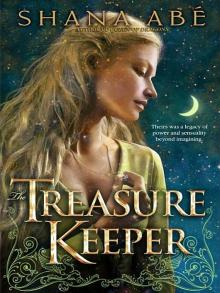 The Treasure Keeper
The Treasure Keeper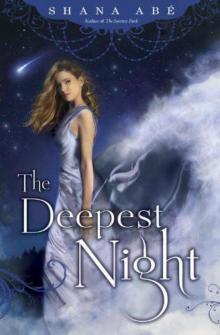 The Deepest Night
The Deepest Night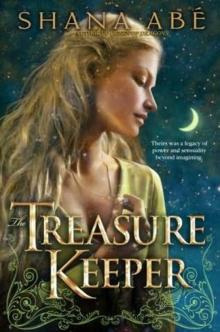 The Treasure Keeper d-4
The Treasure Keeper d-4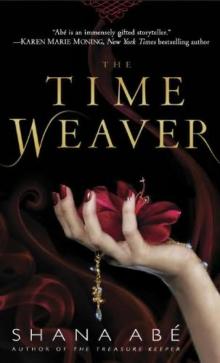 The Time Weaver d-5
The Time Weaver d-5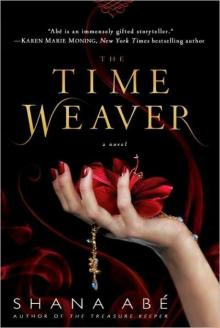 The Time Weaver
The Time Weaver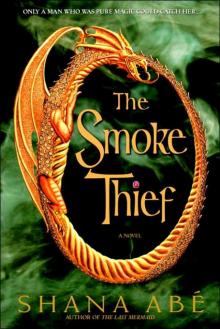 The Smoke Thief
The Smoke Thief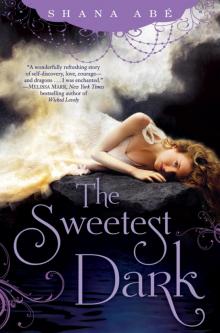 The Sweetest Dark
The Sweetest Dark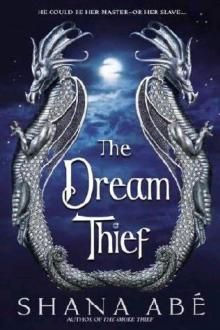 The Dream Thief
The Dream Thief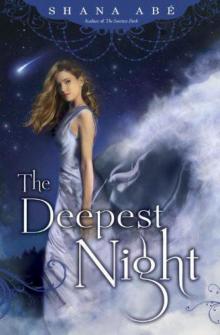 The Deepest Night tsd-2
The Deepest Night tsd-2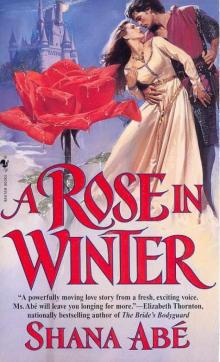 A Rose in Winter
A Rose in Winter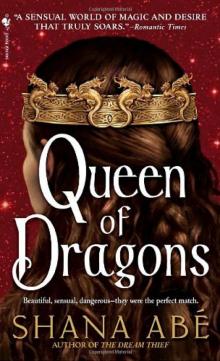 Queen of Dragons d-3
Queen of Dragons d-3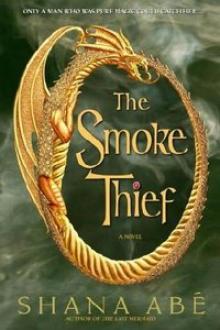 The Smoke Thief d-1
The Smoke Thief d-1